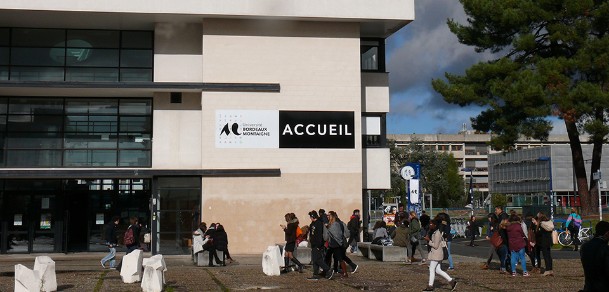Organize your stay - Bordeaux Montaigne University v1.2
Organize your stay

Choose your courses
Choose your courses (note that some courses have limited capacity):
- UFR Humanités: Bachelor or Master programmes
- UFR Langues et Civilisations: Bachelor or Master programmes
- UFR Sciences des Territoires et de la Communication: Bachelor or Master programmes
One Unit of Education (UE) is often divided into ECUEs. Those ECUE may be lectures, training courses or seminars.
Learning Agreement
Exchange students coming through the Erasmus+ programme must choose courses in accordance to their learning agreement. Those coming through a bilateral agreement should choose according to the expectations of their home university. Courses should be chosen from the course catalogues, depending on the faculty and level of studies (undergraduate and/or postgraduate).
Classes are mostly taught in French. You can download on the left column the list of classes taught in foreign language (English, Spanish and Portuguese).
At least 50% of classes listed in your learning agreement, defined in accordance with your supervising teacher, should match the area of study agreed upon in the agreement signed by both institutions.
Please note: You will need to upload your learning agreement on the Online Learning Agreement platform. If your university is not connected to the platform, you will need to send your learning agreement directly to your coordinator (see list hereinabove) specifying: your full name, home university, level of study, period of mobility. Please add incomingstudents @ u-bordeaux-montaigne.fr in copy of your email. The deadlines for the signature of the learning agreement is decided by your home university.
The total number of ECTS credits that you need to earn during your mobility is set by your home university. Be careful, research work, Master's thesis and doctoral research "internships” do not provide ECTS credit.
Pedagogical coordinators
Depending on your institution and area of study, you can find the name of your coordinator here:
- For Erasmus+ agreements (mainly Europe, Switzerland, UK and Turkey)
- For bilateral agreements (outside Europe or outside Erasmus+ agreements)
They will be your pedagogical referent throughout your stay. Feel free to contact them for all questions related to your choice of classes.
You must schedule an appointment with your coordinator as soon as classes start in order to validate your learning agreement.
Evaluation and gradation
You will be evaluated during the whole semester by every teacher who will have defined the evaluations modalities at the start of the first class. There will be no need to participate in the final exams, which take place at the end of the semester (January, April or June for the second session).
Conversion table:
|
Grade |
Note/Scale |
Mention/Description |
Grade ECTS |
Comments |
|
|
THF |
18 - 20 |
Highly Honorable with Praise |
A+ |
Relatively rare |
ECTS |
|
TB |
16 - 17.99 |
Very Good - Highest Honors |
A+ |
| |
|
B |
14 - 15.99 |
Good - High Honors |
A |
| |
|
AB |
12 - 13.99 |
Quite Good - Honors |
B |
| |
|
P |
10 - 11.99 |
Satisfactory |
C |
| |
|
E |
8 - 9.99 |
Fail |
F |
Passable as long as the overall average of grades remains above 10 |
No ECTS |
|
E |
0 - 7.99 |
Fail |
F |
|
The French university grading system is based on grades from 0 to 20 :
- A grade between 10 and 20 means passing and the student will earn the corresponding ECTS Credits.
- A grade below 10 means failing.
- "ABI" or "Absent" means that the student did not sit the exam, and therefore will not earn any ECTS Credits.
- "Assidu(e)" means the student did not sit the exam but participated in tutorial classes, lectures or seminars. The student will NOT earn any ECTS Credits.
Please note: A grade of 16 or above is generally very difficult to obtain.
1. File an application
2. Organize your stay
3. Your arrival
4. Student life and culture
5. Q&A for exchange students